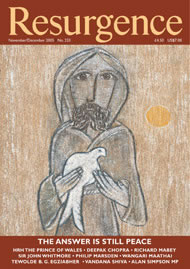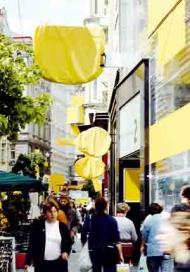IN HIS FIRST speech to the American nation after the disasters of September 11, 2001, George Bush told the citizens, "If you love your country, if you want to fight terrorism, go out this weekend…and shop!"
That is the essence not merely of capitalism but of Americanism, of patriotism, even of just warfare. Shop. And, mind you, it doesn't matter what you're shopping for - it is the act of shopping that matters, not what you buy. Shop and you make the nation strong.
However bizarre that may strike you as being, Bush meant every word he said, and he was expressing a very profound component of the American belief system. Shop, and you help turn over the engines of commerce; you make people rich. Shop, and you keep the United States going on the cycle it has been on for twenty-five years now, spending more on imported goods than it earns on exported ones - to the tune of about $666 billion a year. That's $1.8 billion every single day.
Not surprisingly, this madness has long drawn its share of critics, debunkers and resisters. The rising number of people over their heads in debt and/or declaring bankruptcy has been a well-known scandal. For years, psychologists have given lectures, written books, gone on TV to try to get people to escape from the addiction of consumerism. Economists regularly point out that an economy dependent on debt, in the billions of dollars, cannot last for ever.
Now, however, within the last few years, a whole new set of resisters has emerged: activists and artists who are actually urging people, in all seriousness, not to shop. Or at least not so much and so often, and not in chain stores, nor in the 'big-box' stores, and especially not on the day that has traditionally been the kick-off for the big Christmas buying frenzy, the fourth Friday in November (the day after Thanksgiving in the US).
The stop-shopping movement is a somewhat odd sort of coalition, but it is serious and active and has extended its reach worldwide, almost everywhere that industrial capitalism has lifted its banner.
Buy Nothing Day (BND) is probably the most popular expression of it. One version of it was started as long ago as 1992 by Kalle Lasn, publisher of Adbusters magazine in Vancouver, and it has grown every year since. Last year, for example, there were Buy Nothing Days in New York, Washington, Portland (Oregon), Newark (Delaware), Lafayette (Louisiana), San Francisco, Vancouver, Montreal, Tokyo, Tel Aviv, Sydney and London, and that's probably leaving out many that didn't get great publicity (which is often a problem - newspapers and TV stations, which depend on advertising, often refuse to publicise BND actions). There are several BND websites, including www.buynothingday.co.uk.
The impulse behind BND is simple enough: "NO PURCHASE NECESSARY!" The challenge is to try simple living for a day: spend time with family and friends, rather than spend money on them. People make a pact with themselves to take a break from shopping as a personal experiment or public statement, and the best thing is that it's free!!! But the idea is not just to change habits for a day - Buy Nothing Day exposes the environmental and ethical consequences of consumerism. It asks people to make a commitment to consuming less, recycling more and challenging companies to clean up and be fair.
Another group, not connected to Adbusters, has a www.buynothingday.org website, where it asserts, "We believe in nothing and we think you should too." It argues that the friendliest thing you can do is "give the gift of nothing."
Consume®Evolution, a new magazine for the stop-shopping movement, or at least its anti-mass-marketing division, has just been launched in New York City by Scott Ballum. "In a world where there is a Starbucks on every corner," he says, "independent retailers are undersold and out-marketed by global corporations, and fashion individuality is mass-produced and marketed to every demographic as 'unique,' it's time for a revolution - an evolution of consumerism." The magazine, its initial statement says, "was created out of the desire to raise awareness of the crippling effect mass-marketing and globalisation has on local industry, our buying habits, and our culture. As more and more Gap-wearing, iPod-listening, Starbuck-drinking, Fox-watching, Wal-Mart-shopping, SUV-driving, metrosexual clones appear in our neighborhood…it's time we started making more personal decisions when we go shopping."
As serious as the anti-consumerism message is, the groups involved do not take themselves with great seriousness. But easily the wackiest, and most colourful, revolves around American performance artist Bill Talen, who calls himself the Reverend Billy of the Church of Stop Shopping and dresses in a white suit with a clerical collar under a dyed-blond pompadour. His mission is to preach the gospel of resisting consumerism and he is backed up in his performances at New York's St Mark's Church by The Stop-Shopping Gospel Choir.
But there's more than preaching. In fact, there's very little street theatre the Reverend Billy hasn't done. He has gone into chain stores with his followers and performed 'exorcisms' over the cash registers. He and his group have gone into Wal-Mart stores, walking around with empty shopping carts until they mysteriously form a huge conga line going up and down the isles. He regularly produces 'interventions' at stores like Starbucks, where he starts preaching to the customers: "We are from the Church of the Necessary Interruption" and warns them that daily consumption is the road to damnation. (So regularly, in fact, that at one point Starbucks sued him, got a sentence passed against him for one day of community service, and obtained an injunction forbidding him to set foot in any Starbucks store now or in the future.)
The Reverend Billy, for all his theatrics, has a deeper message, though he puts it with characteristic levity: "Not-buying is a brave thing to do. At first it may induce vertigo, identity weirdness, and a desire for an unwanted pregnancy. But most often a new believer will have an abnormal kitsch-acquisition fit. The first response to the break in buying may be a huge sucking sound in your hands - you want to buy something, anything…
"When you lift your hand from the product and back away from it, a bright, unclaimed space opens up. Consumers think it is a vacuum. It is really only the unknown.
"In the Church of Stop Shopping we believe that buying is not nearly as interesting as not-buying. When you back away from the purchase, the product may look up at you with wanton eyes, but it will slump quickly back onto the shelf and sit there trying to get a life. The product needs you more than you need it - remember that."
The Reverend Billy has carried his message around the world since 1997, including a Stop Shopping Roadshow in Britain in 2003 www.breathingplanet.net, with a performance at the FACT Centre in Liverpool. He even descended once on the headquarters of Halliburton in Dallas and started preaching to the people in the cafeteria. He told them that Halliburton was the devil and that for their salvation they had "to quit their jobs and divest" their stock.
His message is also to be found in CDs, videos, and books, available - for buying, mind you - on his website, www.revbilly.com. (That's 'com' as in 'commercial'.) He justifies the contradiction by saying that not all shopping is sinful, and when criticised because his CD is sold by the giant chain Tower Records and by Amazon.com, he replies only: "We have to embrace the contradiction." It's the same contradiction, actually, faced by any artists who have a message they want to get out to a wide audience, since those that control the media are more often than not the corporations most culpable in commercialism and mass marketing.
The stop-shopping movement may not bring down the edifice of capitalism, but it is proving effective at raising some important issues of the excesses of market capitalism and its handmaiden corporations, media outlets, and advertising firms. And it seems to be having a good deal of fun while doing
so.
Buy Nothing Day in the UK is on Saturday 26th November.








